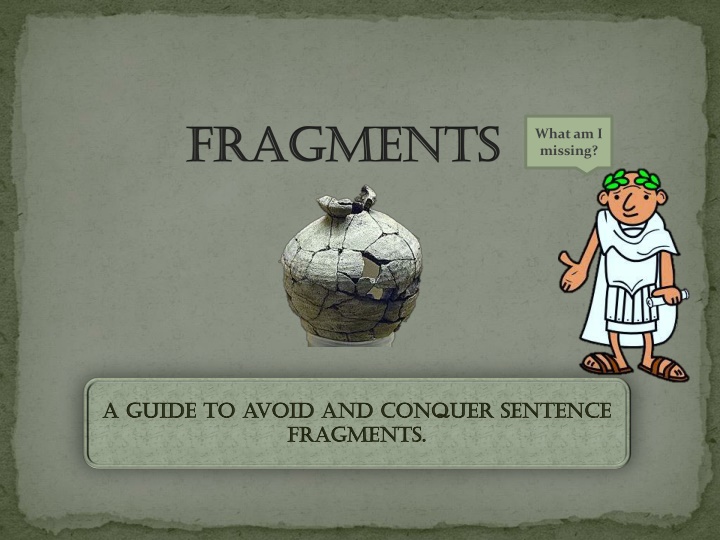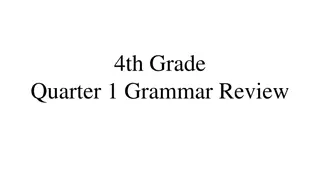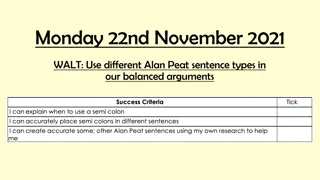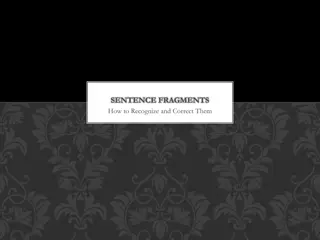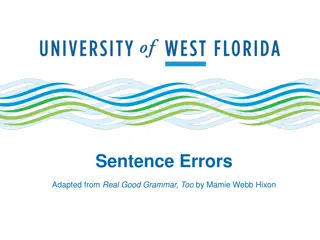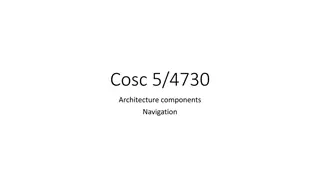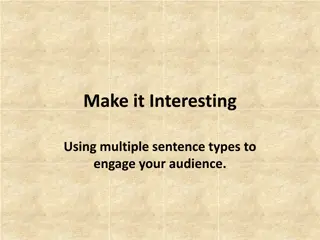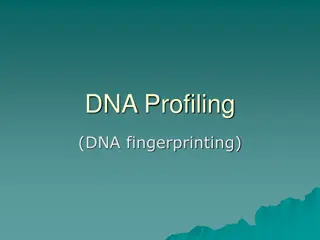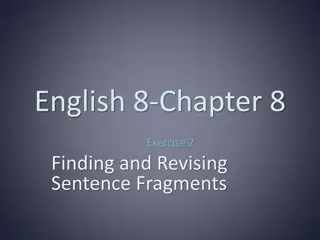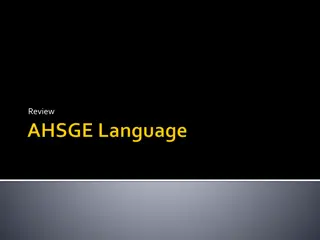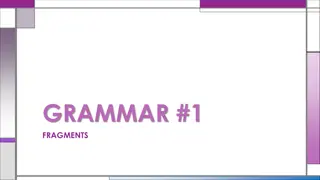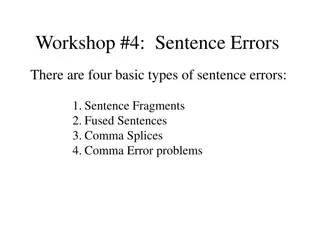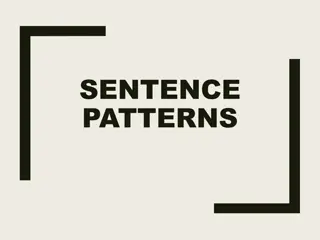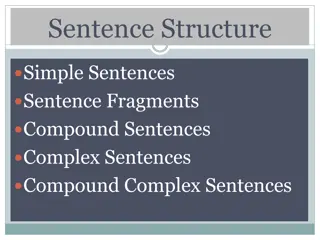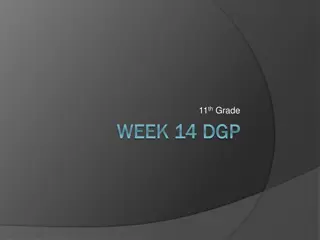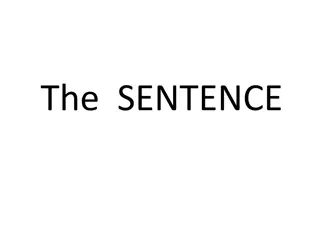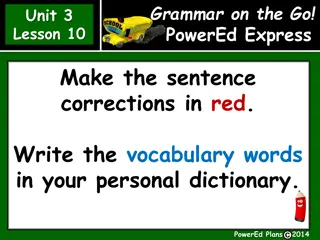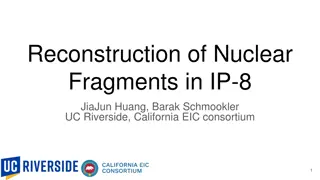Mastering Sentence Fragments: Your Essential Guide
Discover the keys to identifying and correcting sentence fragments with this comprehensive guide. Learn about the different types of fragments, such as dependent word fragments, and how to fix them by connecting them to independent sentences. Enhance your writing skills and conquer sentence fragments effectively.
Download Presentation

Please find below an Image/Link to download the presentation.
The content on the website is provided AS IS for your information and personal use only. It may not be sold, licensed, or shared on other websites without obtaining consent from the author.If you encounter any issues during the download, it is possible that the publisher has removed the file from their server.
You are allowed to download the files provided on this website for personal or commercial use, subject to the condition that they are used lawfully. All files are the property of their respective owners.
The content on the website is provided AS IS for your information and personal use only. It may not be sold, licensed, or shared on other websites without obtaining consent from the author.
E N D
Presentation Transcript
Fragments Fragments What am I missing? A guide to avoid and conquer sentence A guide to avoid and conquer sentence fragments. fragments.
What is a sentence fragment? What is a sentence fragment? A sentence fragment is a word group that lacks A sentence fragment is a word group that lacks a subject or a verb and fails to express a a subject or a verb and fails to express a complete thought. complete thought. How do I fix this? Verb Verb Complete Complete Thought Thought
Step 1: Step 1: Know The Type of Fragment. Here are the Know The Type of Fragment. Here are the four most common types of fragments four most common types of fragments: : Dependent Dependent- - word fragment word fragment ing and To fragments and To fragments I. I. II. II. - -ing III. III. Added Added- -detail fragment detail fragment IV. IV. Missing Missing- -subject fragment subject fragment
Dependent- Word Fragment Dependent Words Dependent Words List List What is a dependent What is a dependent- - word fragment? word fragment? Some sentences that begin with that begin with dependent words dependent words (like the words (like the words listed to the listed to the right) can create right) can create fragments. fragments. After After When, Whenever When, Whenever Some sentences Although Although Where, Wherever Where, Wherever As As Whether Whether Because Because Which, Whichever Which, Whichever Before Before While While Even though Even though Who, Whom, Whose Who, Whom, Whose How How If, even if If, even if In order that In order that Since Since That, so that That, so that Unless Unless Until Until What, Whatever What, Whatever
Examples of Dependent Word Examples of Dependent Word Fragments Fragments Examples of how dependent words can create a fragment: After I cashed my paycheck. 1. Although I was nervous. 2. If I don t get a raise soon. 3. When the sun came out. 4. Since I love cats. 5. What are these sentences called? Dependent sentences because they have to rely on another sentence to become grammatically correct. What do they need? To be attached to an independent sentence with a comma What s that again? An independent sentence contains a subject, a verb, and expresses a completed thought. Let s learn how to fix these sentences on the next slide!
How to correct Dependent How to correct Dependent Word Fragments Word Fragments After I cashed my paycheck. 1. Although I was nervous. 2. If I don t get a raise soon. 3. When the sun came out. 4. Since I love cats. 5. With a comma, attach an independent sentence onto the dependent sentence. For example: After I cashed my paycheck, Ipaid my bills. 1. Although I was nervous, I gave a great speech. 2. If I don t get a raise soon, I will quit. 3. When the sun came out, theflowers started to bloom. 4. Since I love cats, Iadopted three of them. 5. Notice: The subject is in bold, the verb is italicized, and the complete thought is underlined. Note: We attached the dependent sentence to the independent sentence with a COMMA.
Examples of Ing and To Fragments Cate walked all over her neighborhood yesterday. Trying to find her cat Bobo. Several people claimed they had seen him only hours before. 1. At the Chinese restaurant, Fred used chopsticks. To impress his date. He spent one hour eating a small bowl of rice. 2.
Corrected Examples with Explanations of Ing and To Fragments Cate walked all over her neighborhood yesterday, trying to find her cat Bobo. Several people claimed they had seen him only hours before. Explanation Here, we attached the first independent sentence starting with the subject, Cate, and attached it to the dependent sentence starting with the word, trying, with a comma and took out the period and lowercased the t. We placed a comma before the word, trying, because that word is not a proper subject, so that sentence cannot stand on its own. It has to depend on the first independent sentence because it contains a subject, a verb, and a complete thought to be grammatically correct. 1. At the Chinese restaurant, Fred used chopsticks. To impress his date, he spent one hour eating a small bowl of rice. Explanation For this sentence, we took away the period after the word, date, and we replaced it with a comma because starting a sentence with the word, to, automatically makes it a dependent clause, so the sentence needs to rely on the independent sentence starting with the subject, he. 2.
Added- Detail Fragments An added-detail fragment usually lacks a subject and a verb and often begins with one of the signals words below:
Examples, Corrections, and Explanations of Added-Detail Fragments Examples: Phillip works at a movie theatre. He enjoys the fringe benefits. Like seeing the new movies first. 1. Amber loves watching daytime television shows. Especially old movies and soap operas. 2. Corrected Examples: Phillip works at a movie theatre. He enjoys the fringe benefits like seeing the new movies first. 1. Amber loves watching daytime television shows, especially old movies and soap operas. 2. Explanation: For #1, we attached the second sentence to the first and did not add a comma because there does not need to be a comma before the preposition like. 1. For #2, we attached the second sentence to the first and added a comma before especially. Note: especially is one of the words in the list in slide #10. 2.
Missing- Subject Fragment A missing-subject fragment is exactly what it sounds like. It s a sentence that is missing a subject, so it cannot be an independent sentence. Remember, the subject is a noun(s) that grounds the sentence. It s who or what the sentence is about. Where is the subject?
Examples of Missing-Subject Fragments Christine loved getting wedding presents. But hated writing thank-you notes. 1. 2. Many people are allergic to seafood. They break out in hives when they eat it. And can even have trouble breathing properly.
Corrected Examples with Explanations of Missing- Subject Fragments Christine loved getting wedding presents but hated writing thank-you notes. 1. Explanation: For #1, we took out the period before the word, but, and lowercased the b. We did this because in the first sentence we have a proper subject, Christine, but in the second sentence, we do not have a subject, so that sentence cannot stand alone unless we added the word, she, in it. Many people are allergic to seafood. They break out in hives when they eat it, and they can even have trouble breathing properly. 2. Explanation: For #2, we added a comma before the coordinating conjunction, and, and then we added the subject, they. Adding a comma before the coordinating conjunction and adding the subject, they, makes this an independent sentence. Break Down: You can either attach the part of the sentence that is missing a subject to a sentence that has a subject, or you can simply add a subject to form an independent sentence.
Review Remember, the key to conquering sentence fragments is to always make sure that your sentences contain a subject, a verb, and express a complete thought.
CREDITS AND EXTRA HELP! Most of the information in this PowerPoint is from John Langan s book, College Writing Skills with Readings, Eighth Edition. For extra help on fragments: Go to: http://owl.english.purdue.edu/owl/resource/620/1/ Stop by our center for more tip sheets, worksheets, and computer exercises, located on the Winter Park Campus in room 136!
